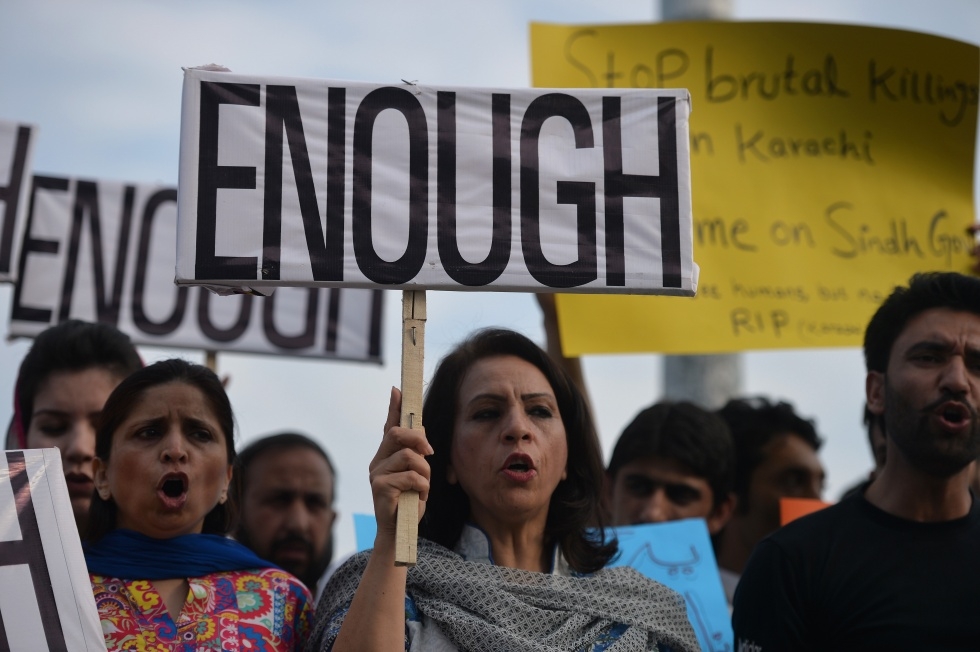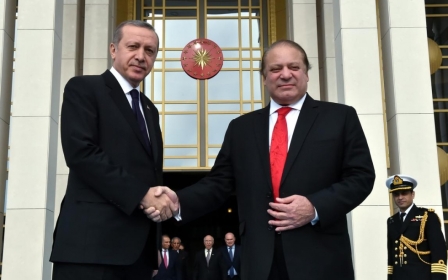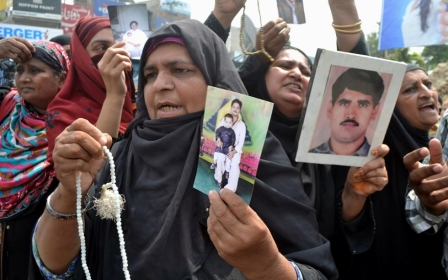Islamic State claim responsibility for 43 killed in Pakistan bus attack

The Islamic State (IS) group have reportedly claimed responsibility for the killing of 43 people in Pakistan, the first time the group have claimed an attack in the country.
"Thanks be to Allah, 43 apostates were killed and around 30 were wounded in an attack carried out by Islamic State soldiers on a bus transporting Shia Ismaili infidels in the city of Karachi," IS said in an online statement.
IS also announced the creation of a branch in what they called the Khorasan province, referring to an ancient area of land covering parts of Pakistan, Afghanistan, Iran and Turkmenistan.
Ghulam Haider Jamali, police chief of Sindh province told reporters at the site - in the eastern district of Malir – that leaflets had also been found linking the attack to IS.
"Six terrorists came on three motorcycles, they entered the bus and began firing indiscriminately. They used 9mm pistols and all those killed and injured were hit by the 9mm pistols," he said.
According to AFP, another group suspected of having links to IS called Jundallah – which split from the Tehrik-i-Taliban (TTP) in November 2014 - have also claimed responsibility.
Shiites - along with other religious minorities - in Pakistan have been killed in their thousands in the last decade, usually at the hands of sectarian groups like the TTP and Lashkar-e-Jhangvi.
The Ismaili sect differs from Shiite Islam in that, while they agreed on the importance of the line of succession from Muhammed, they believe that his descendent exists in the form of the Aga Khan, who serves as caliph of the Ismailis.
The current Aga Khan – a British-Iranian billionaire and horse-racing fan – offered his condolences for the victims of the bus attack.
"This attack represents a senseless act of violence against a peaceful community. My thoughts and prayers are with the victims and the families of those killed and wounded in the attack," he said.
'Culture of impunity'
Shiite Ismaili demonstrators gathered in Islamabad on Wednesday carrying placards reading “Enough” protesting the continued killing of their sect, while human rights groups condemned the government's failure to prevent the attack.
“While today’s attack is alarming, it is the product of an equally alarming climate of impunity," said David Griffiths, Amnesty International’s Deputy Director for Asia Pacific. "We urge the Pakistani authorities to bring to justice the perpetrators of violence committed in the name of religion in this and many previous cases, in fair trials and without recourse to the death penalty. Official complacency will only encourage further attacks.”
Historically, the rise of groups like IS and al-Qaeda has been traced back to the funding of militant groups in the 1980's by the Pakistani leader Zia ul-Haq, allegedly at the behest of Western intelligence agencies, for the purpose of fighting the Soviet Union in Afghanistan.
"For more than a decade some 25,000 Islamic militants, from nearly thirty countries around the world, had streamed through [northern city of] Peshawar on their way to the jihad," wrote Mary Anne Weaver, in the Atlantic in 1996.
"Five years after the jihad ended, a thousand or so remained, some in Peshawar itself, others encamped in the mountain passes of the ungovernable tribal areas bordering Afghanistan, planning and executing what investigators now believe were terrorist acts that have reached from Cairo to Algiers, Manila to Bangkok - and to the streets of Islamabad, Riyadh, Peshawar, and New York."
New MEE newsletter: Jerusalem Dispatch
Sign up to get the latest insights and analysis on Israel-Palestine, alongside Turkey Unpacked and other MEE newsletters
Middle East Eye delivers independent and unrivalled coverage and analysis of the Middle East, North Africa and beyond. To learn more about republishing this content and the associated fees, please fill out this form. More about MEE can be found here.




